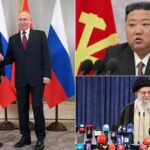MANILA, PHILIPPINES — Japan and the Philippines announced Friday the start of negotiations for a defense pact that would allow troops to be deployed to each other’s territory, a move analysts say is largely prompted by China’s increasingly aggressive behavior in disputed waters.
Japanese Prime Minister Fumio Kishida met with Philippine President Ferdinand Marcos Jr. in Manila on a two-day official visit, during which Kishida described the countries’ bilateral relationship as in its “golden age.”
Kishida expressed their shared “serious concerns” about increasing tensions in the East China Sea and the South China Sea, where Tokyo and Manila are locked in territorial disputes with China.
“[Any] attempt to unilaterally change the status quo by force is unacceptable,” Kishida said.
While he did not mention Beijing, the statement came after a series of maritime confrontations in the South China Sea, including two collision incidents last month between Philippine and Chinese ships.
Manila accused Beijing of deliberately colliding with its boats, and Japan, in condemning the incident, said it stands with the Philippines in upholding the maritime order.
Analysts said these growing concerns against an increasingly assertive China played a huge role in the decision by Manila and Tokyo to deepen security ties.
“Having a shared threat perception is one of the most important drivers for closer strategic relations,” said Don McLain Gill, an international studies lecturer at De La Salle University in Manila.
“Japan and Manila share the same interest for stability … but they also share the same wariness for a particular threat — which is China,” he said. “And that would allow both countries to narrow down the focus of their cooperation to make it more specific based on this shared threat.”
The two countries are negotiating a reciprocal access agreement, which could facilitate joint activities by their armed forces, including joint military exercises.
Japan has separate similar agreements with the United Kingdom and Australia, and the Philippines has such agreements with Australia and the United States.
Gill said this closer alliance with Japan is a “natural alignment” for the Philippines, which has enjoyed strong economic support from Tokyo in the past.
“It’s not something that is forced, because the foundation was already strong for the past few years, but now we are adding to that foundation based on the contemporary trends in regional geopolitics,” Gill said.
Military cooperation between the two countries has developed further under Marcos, who came to power last year and restored the country’s alliance with the United States.
Under Marcos, the Philippines asserted the 2016 international tribunal ruling that declared China’s historical claims in the South China Sea illegal, in a turnaround from his predecessor, former President Rodrigo Duterte, who sought to appease Beijing in hopes of attracting investment.
The Philippines, Japan and the United States held their first joint coast guard drills in the South China Sea in June, and Kishida said they will “further strengthen” their trilateral alliance.
“The Philippines is earning a lot of respect because right now what we’re seeing is we’re not just basing everything on the law but we’re actually coupling this with action,” Froilan Calilung, a political science professor at University of Santo Tomas, told VOA.
Among the actions Calilung referred to was the Marcos order to remove a floating barrier the Chinese coast guard installed in the Scarborough shoal in September to prevent fishers from entering the lagoon.
Source : VOA News















